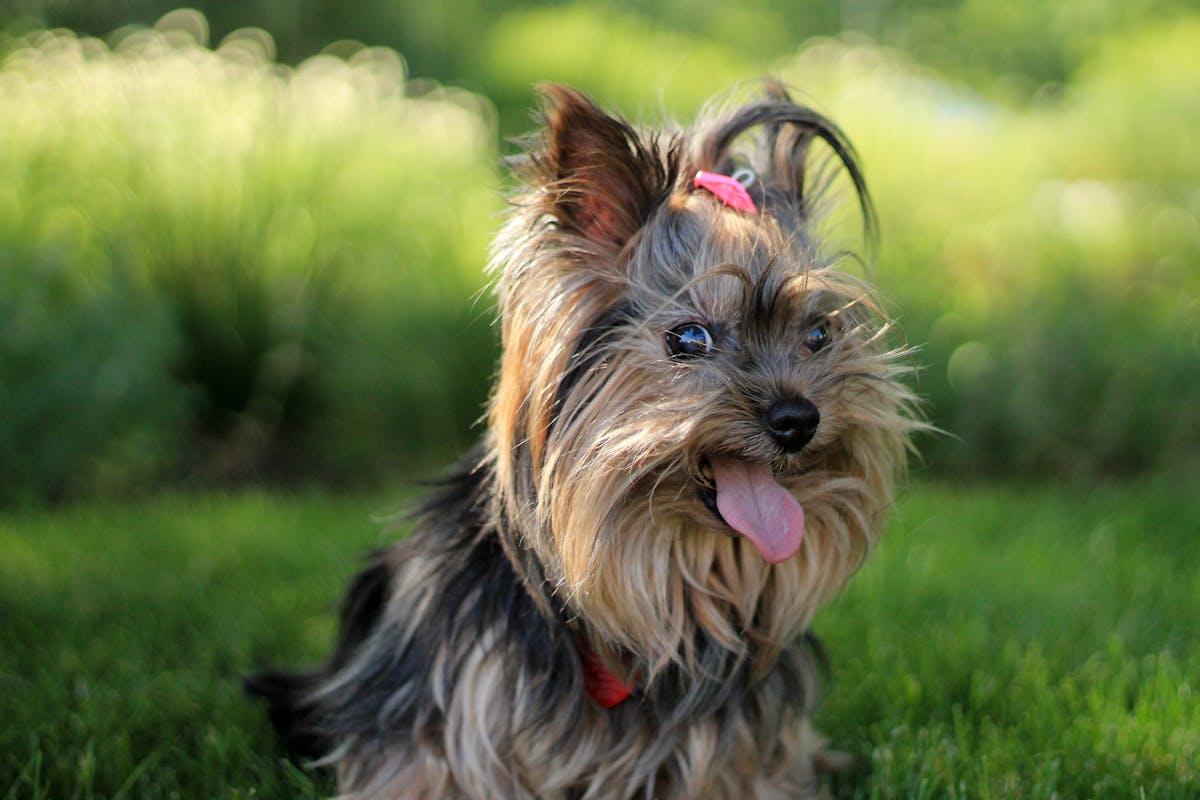The Yorkshire Terrier dog breed is a delightful combination of charm and tenacity. Most owners affectionately refer to them as Yorkies. These small yet bold dogs captivate the hearts of many with their luxurious coats and spirited personalities.
If you’re considering adding a Yorkie to your family or already have one, understanding their temperament, grooming needs, and overall care is vital. This comprehensive guide will help you ensure a happy and healthy life for your Yorkshire Terrier.
Table of Contents
ToggleThe Origin and History of the Yorkshire Terrier
The Yorkshire Terrier originated in England during the 19th century, developed primarily in Yorkshire and Lancashire. Initially bred as working dogs to control rodents in textile mills, these dogs soon transitioned into companions for the affluent due to their striking appearance.
Yorkies were created by crossing breeds such as the Skye Terrier, Maltese, and the now-extinct Paisley Terrier. The breed’s small size, intelligence, and unique appearance quickly made it a favorite among high society.
Officially recognized by the Kennel Club in the late 1800s, they gained popularity across Europe and America, cementing their status as one of the most cherished toy breeds.
Temperament of Yorkies
Yorkshire Terriers may be small, but their personalities are anything but. They are known for their courage and confidence, Yorkies often forget their size, displaying a fearless demeanor that surprises many.
Affectionate and Loyal
Yorkies form strong bonds with their families, often becoming fiercely loyal to one particular person. They crave attention and thrive on affection, making them excellent lap dogs. Their loyalty often translates into a protective nature, making them attentive companions.
Energetic and Playful
Despite their small stature, Yorkies have high energy levels. They love interactive games, brisk walks, and mental challenges like puzzle toys. Their playful spirit ensures that they’re always ready for fun, whether it’s chasing a toy or learning a new trick.
Independent Yet Alert
While Yorkies enjoy companionship, they also exhibit a streak of independence. Their alertness and keen senses make them excellent watchdogs, ready to sound the alarm at any unusual activity.
However, this vigilance can sometimes manifest as excessive barking, a trait that requires patient training to manage.
Physical Characteristics of Yorkshire Terriers
Yorkshire Terriers are easily recognizable by their distinct appearance:
Size and Build
- Weight: Typically 4 to 7 pounds.
- Height: Around 7 to 8 inches at the shoulder.
- Build: Compact yet well-proportioned, with a straight back and poised stance. Their delicate frame belies their sturdy and resilient nature.
Coat and Color
Yorkies boast a fine, silky coat that falls straight and evenly. Puppies often start with black and tan coloring, which transitions to a steel blue and gold as they mature.
This iconic coat requires meticulous care to maintain its sheen and softness. The color transition, known as “breaking,” usually occurs between 6 months and 3 years of age.
Grooming the Iconic Yorkie Look
The Yorkshire Terrier’s coat is one of its most striking features but demands consistent care to remain healthy and beautiful.
Daily Brushing
Due to their long, fine hair, Yorkies are prone to tangles and mats. Daily brushing with a soft-bristle brush or metal comb prevents knots and keeps their coat looking sleek. Always start at the ends of the hair and work your way up to avoid pulling or discomfort.
Bathing Routine
A Yorkie’s coat benefits from regular baths every two to four weeks. Use a high-quality, dog-specific shampoo and conditioner to nourish their hair and skin. Thorough drying is essential to prevent skin irritation. A blow dryer on a low setting can help achieve a polished look.
Trimming and Styling
Yorkies’ hair grows continuously, making regular trims a necessity. Many owners opt for a “puppy cut” for easier maintenance, while others prefer the traditional show-style look. Professional grooming every 4 to 6 weeks is often recommended to maintain their appearance.
Ear, Nail, and Dental Care
- Ears: Check weekly for wax buildup or debris and clean gently with a vet-approved solution. Their ears are prone to infections if not kept clean.
- Nails: Trim monthly to prevent overgrowth and discomfort. Long nails can lead to pain or difficulty walking.
- Teeth: Yorkies are prone to dental issues, so daily brushing with dog-specific toothpaste and providing dental chews are vital to preventing tartar buildup and gum disease.
Exercise Needs
Yorkies may be small, but they require regular physical and mental stimulation. Daily walks of 20 to 30 minutes combined with playtime are ideal to keep them fit and happy. Their compact size makes them suitable for indoor activities, but they also enjoy exploring the outdoors.
Interactive toys and training exercises can further enrich their lives, challenging their sharp minds and satisfying their curiosity. Without adequate stimulation, Yorkies may develop destructive behaviors due to boredom.
Diet and Nutrition
Proper nutrition is key to maintaining your Yorkie’s health and vitality.
Choosing the Right Food
Opt for high-quality dog food specifically formulated for small breeds. The food should contain:
- Lean proteins for muscle maintenance.
- Healthy fats for skin and coat health.
- Essential vitamins and minerals for overall wellness.
Portion Control
Overfeeding can lead to obesity, which is particularly harmful to small breeds. Feed your Yorkie two to three small meals daily, following your veterinarian’s recommendations on portion sizes. Be mindful of their caloric intake, especially with treats.
Hydration
Ensure your Yorkie always has access to fresh, clean water. Dehydration can quickly affect their small bodies, especially during hot weather or after exercise.
Health Concerns: Common Issues in Yorkies
Yorkies are generally healthy dogs but are prone to specific conditions:
- Dental Problems: Their small jaws often lead to overcrowded teeth and tartar buildup, causing gum disease if not addressed.
- Luxating Patella: A common issue in toy breeds where the kneecap slips out of place, leading to discomfort or limping.
- Hypoglycemia: Low blood sugar, especially in puppies, which can cause weakness or seizures if not treated promptly.
- Collapsed Trachea: A condition that causes difficulty breathing and coughing. Using a harness instead of a collar can help reduce strain on their trachea.
Regular veterinary checkups, a balanced diet, and preventive care can help mitigate these risks. Early detection and treatment are crucial for managing these conditions effectively.
Training Your Yorkshire Terrier
Training a Yorkie requires patience and consistency. While intelligent and eager to please, their independent streak can sometimes make them stubborn.
House Training
Start early with crate training and a consistent schedule for bathroom breaks. Positive reinforcement, such as treats and praise, works wonders. Be prepared for occasional setbacks, as Yorkies can be slow to housebreak.
Obedience Training
Teach basic commands like “sit,” “stay,” and “recall.” Short, engaging training sessions yield the best results, as Yorkies can lose interest quickly. Their intelligence allows them to learn tricks and commands with ease when motivated.
Socialization
Expose your Yorkie to various environments, people, and other pets from a young age to ensure they grow into well-rounded adults. Proper socialization reduces fearfulness and promotes confidence.
Living with a Yorkie: Adapting to Their Needs
Yorkies thrive in environments where they receive ample attention and love. They do not tolerate long periods of isolation, so consider your schedule before adopting one. Providing cozy bedding, engaging toys, and plenty of interaction keeps them content.
Additionally, Yorkies are sensitive to extreme temperatures due to their small size. Ensure they have appropriate clothing in cold weather and access to shade and water during hot months.
Their small size also makes Yorkshire Terriers susceptible to injury, so supervise interactions with young children or larger pets.
Conclusion
Owning a Yorkshire Terrier can be a deeply rewarding experience, but it requires commitment. Their grooming demands, energetic nature, and need for companionship may not suit every lifestyle.
However, for those willing to meet their needs, Yorkies offer unwavering loyalty, boundless affection, and a lifetime of joy.
References
American Kennel Club






